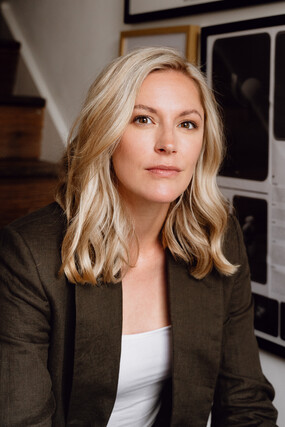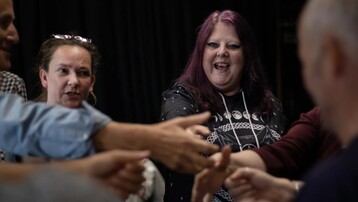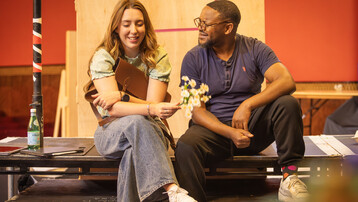News Story

Poppea (Jessica Cale) and Nero (Martha Jones) in The Coronation of Poppea
Credit: Richard Hubert SmithRachel Wise, Intimacy Coordinator for The Coronation of Poppea, tells us about the job of an Intimacy Coordinator and what her role in the production is:
What does an Intimacy Coordinator do?
An Intimacy Coordinator facilitates any intimacy within a scene. Similar to a Fight Director, the job of an Intimacy Coordinator is to safeguard and ensure that everybody in the scene is aware of the protocols in the space. This work is participatory; we don’t come in with pre-choreographed scenes. We make sure that everyone is a part of creating the scene and finding the best way to tell the story, both for the production and for the actors involved. It’s important that every movement is specific, considered, and that there is consent that is revocable. Sometimes the most important question an Intimacy Coordinator can ask is, “is intimacy actually required here?” Sometimes the answer is no, intimacy isn’t needed to tell the story. Our job is to help the cast uncover these things and positively implement them into the production.
How did you become interested in intimacy coordination?
Before being an Intimacy Coordinator was an accredited thing, I was working on a short film where the two actors had an intimate kiss scene that they asked me to help with. I was working as a Movement Director and realized that there were lots of cases where I was being asked to facilitate intimacy. Coming from a background in music and dance, intimacy coordination seemed like a great thing to have in my toolbox in order to best support the people I was working with. I really advocate for having an Intimacy Coordinator present on all sets, but that’s not always the case, so I wanted to be able to facilitate these things.
What is your role in The Coronation of Poppea as Intimacy Coordinator?
Before starting with Poppea, we ran workshops for the entire ETO company, because it gave everybody the opportunity to practice saying no, stopping the space, and supporting each other. We mocked out conversations for if something went wrong and we had to stop. We also prepared them with a toolkit for preparing your body and breath to move forward into the rehearsal process. This was a great way to start the season, because it ensured that everyone had the same shared language going into rehearsals.
For Poppea, I started by having conversations with the creative team. With the costume designer (Basia Binkowska), we ensured that the costumes would facilitate the movement. I also had some amazing conversations with the director (Robin Norton-Hale) about what relationships would be depicted: Nero and Poppea, Nero and Lucano, etc. We talked about why the intimacy was even there, what lens we were seeing it through, and what story we were telling be having intimacy in these moments. We discussed aspects of power play, who out of the characters would initiate movement, and what that told us about them and their world.
In the rehearsal room, we really dug into the detail and did lots of drama and movement exercises to find different relationships and movement qualities. This was all before we even did any blocking and put the scenes on their feet.

What does a session in the rehearsal room look like?
I run a warm up, which includes both physical and mental exercises, meant to help performers come out of their minds and come into their bodies. Realistically, our bodies don’t leave their baggage at the door of the rehearsal room, so it’s important to acknowledge that our bodies are our instruments and accept what we’re working with that day.
As we move into working with the intimacy, we go through choreographed breath sequences and then add the movements in with them. We have a conversation about the relationship we’re depicting, what is happening in the scene, and why it’s happening. Who initiates the movement? What is the power dynamic between the characters? We do a boundary check to see how each of the performers are feeling.
When introducing a movement, I have performers try the movement out on themselves to see how they feel about that touch that day. Considering their boundaries, we settle on choreography. Performers input, “I feel that this character would put their hand there, at this moment, for this long” then we practice the gesture, ask for consent, and find an appropriate quality of the touch. Then we rehearse with counts, and finally, rehearse with music. Stage Management will record the scene so we can refer back to it. At the end of staging an intimacy scene, we do a mental, physical and breath ‘checking out’ exercise to reset. This is like a ‘checking in’ and a limber exercise but in reverse, to bring us back into the ‘real world.’
What is something about The Coronation of Poppea that you’re excited for?
I’m so excited to see the entire opera. It was brilliant to be in on day 1 of rehearsals to hear all about the sets and costumes, so I can’t wait to see how they turned out. Of course, I’m excited to see the singers I’ve been working with perform. I’m anticipating the movement and the brilliant chemistry between the performers. Robin has brought a really seamless and beautiful team together. I'm excited to see all of these elements come together!

About Rachel
Connect with Rachel’s work at @rachelwisemovement and rachelwise.co.uk.
Rachel was awarded The Grange Festival Prize 2023 for Outstanding Young Creative Talent. She was an Associate Junior Opera Director Fellow at Guildhall School of Music and Drama.
After completing BA (Hons) Dance and Performing Arts degree at The Liverpool Institute for Performing Arts in 2011, Rachel trained with International School for Actor and Behavioral Studies.
She studied MA Movement Directing and Teaching at Royal Central School for Speech and Drama and trained in Intimacy Direction with IDC and TIE.
Intimacy credits include, film Half Plate (Semi Finalist for Eurasia International Film Festival); St Paul’s Opera and The Grange Festival.
Resources
Rachel recommends the following resources for those that would like to learn more about intimacy coordination.
International Resources:
UK Resources:
Mental Health & Wellbeing / Training:
Media:
Podcast: "Intimacy Choreography in Conversation"
Recommended Books:
- Supporting Staged Intimacy, A Practical Guide for Theatre Creatives, Managers and Crew; Alexis Black, Tina M. Newhauser; 2022 Routledge
- Intimacy directing for Theatre Creating a Culture of Consent in the Classroom and Beyond; Edited by Dr. Ayshia Mackie Stephenson; 2023 Routledge
- Staging Sex Best Practices, Tools and Techniques for Theatrical Intimacy; Chelsea Pace; 2020 Routledge


